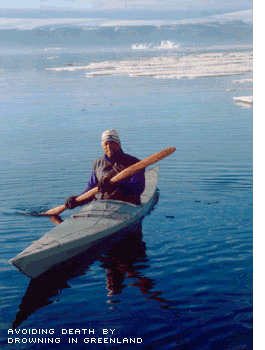
-----

death becomes him (continued)
... hypothermia. You hear it said that freezing to death is "a good way to go." While I don't think any of these deaths that I've described is particularly pleasant, hypothermia strikes me as the least unpleasant. First you get really, really cold, then you become delirious, then you fall asleep -- or rather become unconscious. The body and brain slowly shut down as they're deeply chilled. There are worse ways to die.
Booknoise: Such as?
Stark: Heatstroke, or hyperthermia. That's the nastiest, I think, at least from a physiological point of view. Your body essentially cooks itself from within. The hotter you get, the faster your cellular metabolism breaks down fuel, adding even more heat to your core. It's like a nuclear reactor melting down. Eventually, the heat causes your major organs to hemorrhage, destroys brain cells, melts the tubules of your kidneys and opens perforations in your blood vessels. Fortunately, you've probably passed out long before all of this happens.
Booknoise: What's the best -- or shall we say the worst -- true story of a wilderness death that you've come across?
Stark: One stands out in my mind for being both tragic and gruesome. While attempting to sail from Siberia to North America in the 1740s, Russian navigator Vitus Bering and his crew were stricken with scurvy, "the explorer's disease," which we now know is caused by vitamin C deficiency. Vitamin C acts as a kind of molecular welder to fuse together the tissues found in cartilage, blood vessels, the gums, and other parts of the body. Without it, that tissue unravels. "If the situation continues," as one description puts it, "the body will degenerate into a bleeding pulp for which death is a blessing."
Bering's ship crashed on an island far off the Kamchatka Peninsula. The survivors straggled to shore, many of them dropping dead because the effort of moving caused their scurvy-weakened blood vessels to burst. Bering was buried up to his waist in sand to ease the pain in his legs. He died there on the beach.
Booknoise: Have you ever found yourself in any of the situations described in the book?
Stark: I've been in many sticky situations, although none as harrowing as those in which my characters find themselves. Once, when I was 16 or so and a naive Midwesterner on a trip to Colorado, a friend and I took off into the wilderness on skis. At one point I said to him, "This slope is really steep and the snow's really deep. I wonder if it could avalanche." I casually stomped my ski, and the slope broke away and rumbled down into a gully. It would have buried us both if we'd been below it.
It was incidents like this that got me thinking about writing Last Breath. I wanted to know what would happen to my body and mind if I'd been buried in that avalanche, or if my kayak plunged into an enormous hole in a whitewater rapid. I went on adventures vicariously through my characters, but unlike many of them, I survived.
Back to top